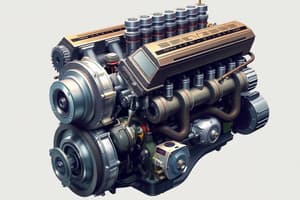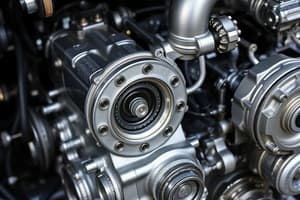Podcast
Questions and Answers
What is the role of coolant in a car's internal combustion engine?
What is the role of coolant in a car's internal combustion engine?
- Accelerating engine corrosion for efficiency
- Absorbing and dissipating heat to control engine temperature (correct)
- Increasing the freezing point of water for better engine performance
- Generating heat to warm up the engine quickly
What is ethylene glycol commonly mixed with to create coolant?
What is ethylene glycol commonly mixed with to create coolant?
- Engine oil
- Diesel
- Water (correct)
- Gasoline
What does the thermostat do in the car's cooling system?
What does the thermostat do in the car's cooling system?
- Regulates air conditioning in the car
- Helps in steering the vehicle
- Controls the flow of coolant through the radiator (correct)
- Ignites the engine to generate heat
How does the radiator help in cooling down the coolant?
How does the radiator help in cooling down the coolant?
What is the purpose of the thermostat in the engine cooling system?
What is the purpose of the thermostat in the engine cooling system?
Why is it important to regularly maintain proper coolant levels in an engine?
Why is it important to regularly maintain proper coolant levels in an engine?
What role does the coolant play in the engine's operation?
What role does the coolant play in the engine's operation?
How does the radiator contribute to maintaining proper engine temperature?
How does the radiator contribute to maintaining proper engine temperature?
Flashcards are hidden until you start studying
Study Notes
Cooling Down the Engine: The Role of the Coolant
When your car is cruising down the highway at full throttle, its internal combustion engine (IC engine) heats up rapidly. To prevent the parts from melting and turning your road trip into a toasty mess, an efficient cooling system takes away the heat. At the heart of this cooling system is the coolant, a liquid that helps control engine temperature.
What is Coolant?
Coolant—or antifreeze—is a specialized fluid that flows through the engine, absorbing and dissipating heat. It's a mixture of water and ethylene glycol, which lowers the freezing point of water and inhibits corrosion. The coolant prevents the engine from overheating and helps maintain optimal operating temperatures.
How Coolant Works
As the engine generates heat, the coolant absorbs it, carrying the heat away from the engine components. The coolant then flows through the radiator, which is a heat exchanger designed to dissipate the heat into the air. The cooled coolant then circulates back into the engine to pick up more heat.
Thermostat and Radiator
Two components of the cooling system help regulate the temperature of the coolant: the thermostat and the radiator. The thermostat is a valve that controls the flow of coolant through the radiator. It is designed to open when the coolant reaches a specific temperature, allowing the coolant to flow through the radiator and cool down. When the engine temperature drops, the thermostat closes to prevent the engine from overcooling.
The radiator is a large, flat, finned surface through which the coolant flows. As the coolant traverses the radiator, it is cooled by the ambient air. The radiator's design efficiently transfers heat to the air, preventing the coolant from boiling or freezing.
Maintaining the Coolant
To keep your engine running smoothly and efficiently, it's essential to maintain proper coolant levels. Regularly checking the coolant level and ensuring it's properly mixed can help prevent overheating and corrosion in the cooling system. Additionally, it's essential to replace the coolant periodically to ensure it remains effective at protecting the engine.
Closing Thoughts
By using coolant, engineers have designed a complex yet effective system to control the engine's temperature. This system ensures that IC engines can safely produce the power needed to propel vehicles down the road without causing catastrophic failures. Without the coolant, engines would quickly overheat and fail, rendering cars inoperable. So the next time you cruise down the road, take a moment to appreciate the unsung hero of the cooling system—the coolant.
Studying That Suits You
Use AI to generate personalized quizzes and flashcards to suit your learning preferences.




